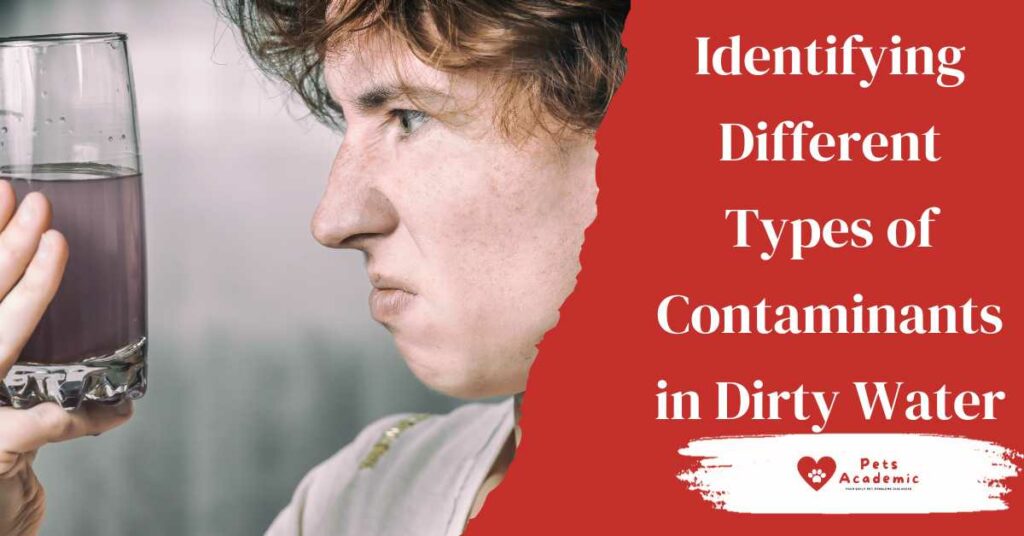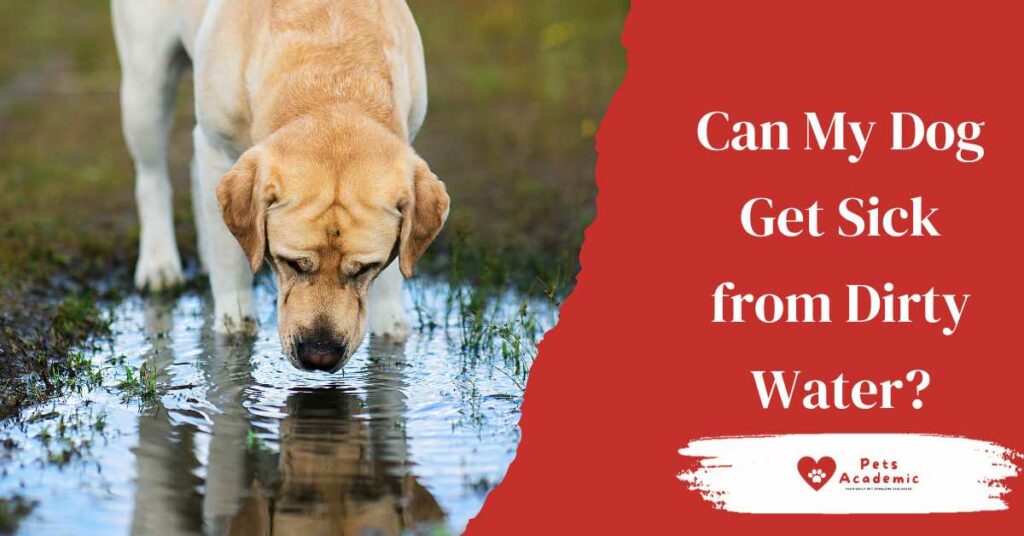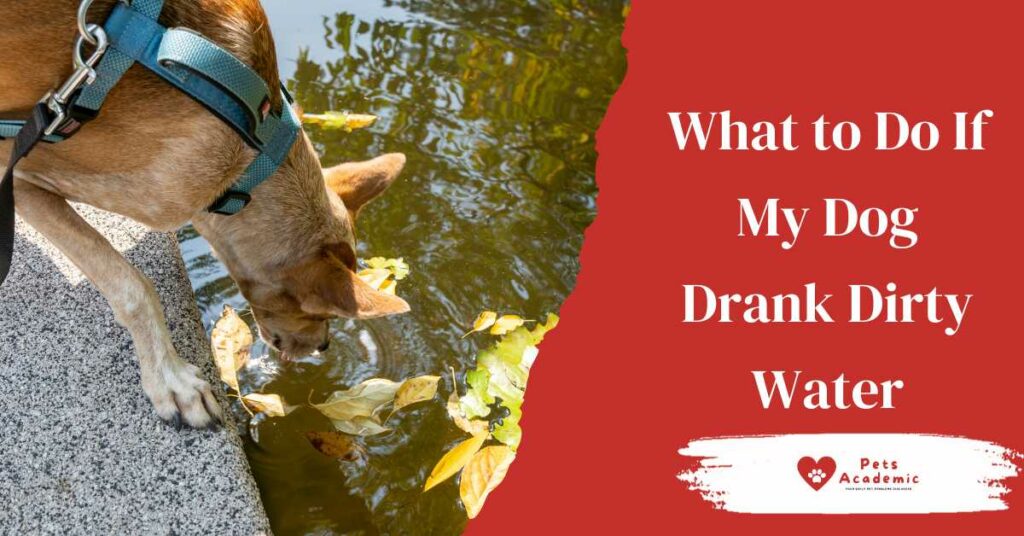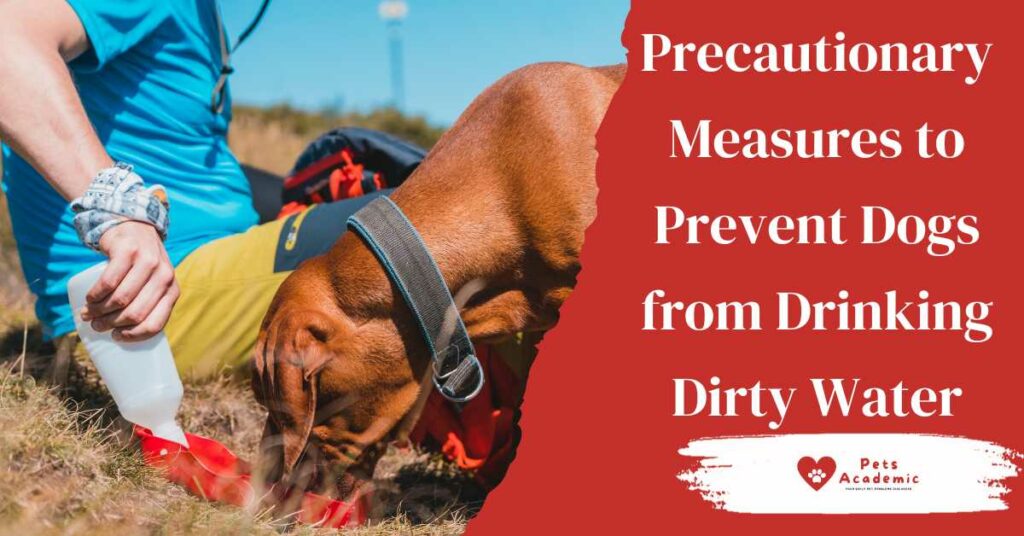Hey there, fellow pet parents! So, you’ve found yourself in a bit of a situation, huh? Your furry friend just indulged in a little impromptu hydration session with some less-than-pristine H2O.
Don’t fret; it happens to the best of us. In this guide, we’re going to dive nose-first into what to do if your dog decides to turn into a water connoisseur of the unconventional kind.
If your dog drank dirty water, monitor them for symptoms like vomiting, diarrhea, or lethargy. Offer fresh, clean water, and contact your vet if severe symptoms occur. Keep an eye out for signs of distress and seek professional advice if needed.

We’ve all been on those walks where our dogs seem to have a sixth sense for the muddiest, murkiest puddles. It’s like they have a PhD in finding the least Instagrammable water sources.
But what’s the big deal, right? Well, it turns out, not all water is created equal, and some of it can lead to a not-so-happy pupper.
So, whether your fur baby’s been sipping from a questionable puddle or decided the neighbor’s pool was more to their taste, we’ve got your back. From the basics of what exactly constitutes “dirty water” to deciphering whether Fido might be staging a canine protest, we’ll cover it all.
Now, grab a comfy seat and your favorite squeaky toy, because we’re about to embark on an informative (and hopefully slightly entertaining) journey through the world of “My Dog Drank What?!” Let’s get started!
Also read: what does it mean when an older dog starts drinking a lot of water
What is Dirty Water?
Alright, let’s get down to the nitty-gritty (pun intended). Dirty water isn’t just about a little extra sediment or a dash of natural flavoring. We’re talking about water that’s been mingling with all sorts of unsavory characters.
Picture this: your dog, with their impeccable timing, decides to take a gulp from a puddle that’s seen more foot traffic than a downtown crosswalk. Or perhaps they’ve had a rendezvous with a stagnant pond that’s become a makeshift spa for algae and critters of all shapes and sizes.
Dirty water can be a cocktail of contaminants, ranging from soil and bacteria to chemicals and even parasites.
It’s like a mystery buffet where you’d rather not know the ingredients. These elements can wreak havoc on your pup’s digestive system and overall health.
Now, don’t get me wrong, we’re not advocating for doggy bubble baths in crystal clear Evian (though that would be a sight to behold!).
But being aware of what constitutes dirty water can help us make more informed decisions when our four-legged explorers decide to take a sip from nature’s water park.
Meanwhile, if you are wondering why my dog won’t drink water, you can read all about that in this article I have written.
Identifying Different Types of Contaminants in Dirty Water

Now that we’re equipped with a deeper understanding of why dirty water can be a concern for our furry friends, let’s take a closer look at the potential suspects that may lurk in those less-than-clear water sources.
- Bacterial Baddies
This category includes notorious characters like E. coli, Salmonella, and Campylobacter. These microscopic troublemakers can cause gastrointestinal distress in dogs, leading to symptoms like vomiting, diarrhea, and general discomfort.
- Parasitic Pests
Giardia, Cryptosporidium, and Leptospirosis are just a few of the parasites that can find their way into contaminated water. They’re not the kind of party guests you’d want, as they can lead to a range of health issues, from digestive upset to more serious conditions.
- Chemical Culprits
From agricultural runoff to industrial waste, dirty water can harbor an array of chemicals that are harmful to both humans and dogs. These can range from heavy metals like lead and mercury to pesticides and herbicides.
- Algae Blooms
In bodies of water like ponds or lakes, certain types of algae can produce toxins that are dangerous for dogs if ingested. Blue-green algae, in particular, can be highly toxic and lead to rapid health deterioration.
- Foreign Objects
Beyond microbes and chemicals, dirty water can contain physical debris like rocks, sticks, or even trash. Ingesting these can lead to choking hazards or digestive issues.
- Excessive Minerals
Some water sources may be naturally high in minerals like calcium or magnesium. While these minerals are essential in small quantities, an excess can lead to health problems for your dog.
Being able to identify these potential contaminants can help us make informed decisions about where to allow our dogs to drink. It’s all about keeping an eye out for the unexpected, just like a vigilant guardian should!
Can My Dog Get Sick from Dirty Water?

Ah, the million-dollar question! Can our trusty sidekicks really suffer the consequences of their questionable beverage choices? The short answer is: absolutely.
You see, just like us humans, dogs can experience a whole range of not-so-fun side effects from sipping on the wrong kind of aqua. Dirty water can be a hotbed for a variety of nasties, from harmful bacteria to parasites looking for a new home.
Bacterial baddies like E. coli and Salmonella can set up shop in contaminated water sources, leading to a gastrointestinal party neither you nor your pup signed up for.
And let’s not forget about the not-so-friendly parasites like Giardia, which can wreak havoc on your dog’s digestive system faster than you can say “vet appointment.”
But wait, there’s more! Chemicals, like those found in certain industrial run-offs, can throw a serious wrench in your pup’s system. It’s like trying to run a high-performance engine on low-grade fuel. Not a good idea, right?
Now, I don’t want to send you into full-blown panic mode every time your dog decides to explore their inner water connoisseur.
After all, life’s too short for constant worry. But a little awareness and a game plan can go a long way in ensuring your pup’s hydration adventures don’t turn into a health hazard.
Next up, we’ll delve into the telltale signs that your dog may have been sipping from the sketchy side of the water menu. So, stay tuned, because it’s time to decode the language of doggy distress signals!
What are the Symptoms of the Consumption of Dirty Water?

Alright, let’s play detective. You’ve got your furry Sherlock and a potential water-based crime scene. Now, how do you know if your pup has been indulging in the liquid equivalent of a questionable food truck?
Keep an eye out for these telltale signs:
- Upset Tummy Tango
If your dog suddenly starts doing the “my tummy’s not happy” dance, complete with vomiting or diarrhea, there’s a good chance that dirty water might be the culprit. It’s like their way of saying, “I may have made a beverage-related error in judgment.”
- Lethargy Limbo
Has your usually perky pooch suddenly transformed into a canine couch potato? If your dog seems unusually sluggish and uninterested in their usual activities, it could be a sign that something’s amiss.
- Waterworks Woes
Excessive drinking or urination can be a red flag. It’s like their system is trying to flush out the unwelcome guests. Keep an eye on their bathroom breaks for any unusual patterns.
- Appetite on the Decline
If your pup suddenly becomes a picky eater or loses interest in mealtime altogether, dirty water could be playing a role. It’s like they’ve declared a temporary food strike.
- Funky Breath Brigade
Notice a sudden change in your dog’s breath? It could be a sign of gastrointestinal distress. Think of it as their way of saying, “Help, my stomach’s in turmoil!”
- General Discomfort
Watch for signs of restlessness, whining, or discomfort. Your dog might be trying to communicate that something’s not quite right in the belly department.
Remember, these symptoms don’t necessarily mean your dog has indulged in a dirty water drinking spree, but they are worth keeping an eye on.
If you notice any of these signs, it’s always a good idea to consult with your vet. They’re the true experts in decoding the canine code.
In the next section, we’ll dive into action mode and discuss what steps you should take if you suspect your pup has had a less-than-ideal hydration experience. So, stay tuned, because it’s time to be your dog’s water wingman!
What to Do If My Dog Drank Dirty Water?

Alright, you’ve got your detective hat on, and you’ve spotted the potential culprits. Now, it’s time to spring into action and be your pup’s hero! Here’s what you should do if you suspect your dog has been indulging in the murky depths:
- Stay Calm, Stay Cool
First things first, take a deep breath. Panicking won’t help anyone, especially not your fur baby. Stay calm, cool, and collected.
- Monitor and Document
Keep a close eye on your pup for any of the symptoms we discussed earlier. Take notes, if necessary. This will be helpful if you need to consult your vet.
- Hydration Station
Offer your dog fresh, clean water. This helps dilute any potential contaminants and keeps them hydrated. Think of it as a mini detox.
- Skip the Scolding
Resist the urge to scold your pup for their water exploration. They’re not doing it to annoy you; they’re just being their curious, adventurous selves.
- Skip the DIY Remedies
While you might be tempted to administer home remedies, it’s best to consult your vet first. Some remedies can do more harm than good.
- Contact Your Vet:
If your dog shows severe symptoms, or if you’re unsure about their condition, don’t hesitate to call your vet. They’re the experts and can provide tailored advice based on your dog’s specific situation.
- Collect a Sample
If your vet advises it, collect a sample of your dog’s vomit or stool. This can be incredibly helpful in identifying any potential culprits.
- Follow Professional Advice
Whatever your vet recommends, follow it to the letter. They know your dog’s medical history and can provide the best course of action.
Remember, you’re not in this alone. Your vet is your partner in keeping your pup happy and healthy. So, don’t hesitate to reach out if you have any concerns.
In our next section, we’ll tackle some specific scenarios, like what to do if your dog takes a dip in the chlorine pool or tries to channel their inner beach bum with a taste of seawater. Stay tuned for some expert tips!
What Should I Do If My Dog Drank Chlorine Water?

Ah, the allure of a crystal-clear pool on a scorching summer day—it’s tempting for both humans and our four-legged friends. But what happens when your pup decides to dive into a chlorine paradise?
- Rinse, Rinse, Rinse
If your dog has had a chlorine encounter, the first step is to rinse them thoroughly. Use fresh, clean water to wash off any residual chlorine. Think of it as a post-pool party cleanse.
- Monitor for Symptoms
Keep a close eye on your dog for any signs of distress. Watch out for excessive coughing, sneezing, or labored breathing, which could be indicators of chlorine irritation.
- Offer Fresh Water
Provide your dog with ample amounts of fresh water to drink. This helps flush out any lingering chlorine from their system.
- Consult Your Vet
If your dog exhibits severe symptoms or seems distressed, don’t hesitate to contact your vet. They can provide further guidance based on your dog’s specific condition.
- Avoid Future Chlorine Conundrums
Consider using a pool cover or designated doggy area to keep your pup away from chlorinated water sources in the future.
Remember, a little chlorine exposure doesn’t necessarily spell disaster, but it’s always better to err on the side of caution. And who knows, maybe your pup will develop a newfound appreciation for sunbathing by the pool instead of cannonballing in!
In the next section, we’ll tackle another watery wonderland: the salty embrace of seawater. So, if you’ve got a beach bum pup on your hands, stay tuned for some expert advice!
What to Do If My Dog Drank Sea Water?

Ahoy, beach lovers and their salty sea dogs! We all know that feeling of sand between our toes and the rhythmic crash of waves in the background. But what about when your pup decides to take a sip from the big blue? Here’s the lowdown on handling a seawater surprise:
- Fresh Water, Ahoy!
After a seawater swig, it’s crucial to offer your dog plenty of fresh water. Sea water is like nature’s own sodium-packed sports drink, and it can lead to dehydration if not counteracted.
- Monitor for Salt Intake
Keep an eye out for signs of excessive thirst or urination. These can be indicators that your pup may have ingested too much salt.
- Keep an Eye on Behavior
Watch for any unusual behavior. Lethargy, disorientation, or vomiting could be signs of saltwater ingestion.
- Rinse and Repeat
If possible, give your dog a rinse with fresh water to remove any residual salt from their coat. This helps prevent skin irritation.
- Limit Future Seaside Sipping
Consider using a leash or providing a designated freshwater source to discourage your pup from lapping up seawater during beach outings.
- Consult Your Vet
If your dog shows severe symptoms or seems distressed, it’s always best to consult your vet. They can provide tailored advice based on your dog’s specific condition.
Remember, a day at the beach should be all about fun in the sun, not a salty surprise for your pup’s taste buds. With a little vigilance and some good old-fashioned beachcomber know-how, you can keep your dog’s seaside escapades safe and enjoyable.
Precautionary Measures to Prevent Dogs from Drinking Dirty Water

Now that we’ve covered the potential contaminants that can lurk in dirty water, it’s time to take a proactive approach to keep your dog’s water adventures safe and enjoyable. Here are some precautionary measures to consider:
- Carry Fresh Water
Whenever you’re out and about with your pup, bring along a supply of fresh, clean water and a portable bowl. This way, you can offer your dog a drink without them resorting to other water sources.
- Use a Leash
Keeping your dog on a leash during walks or outings gives you better control over where they explore. It can prevent them from darting off to sip from puddles or stagnant ponds.
- Choose Safe Water Sources
When selecting places for your dog to play or drink, opt for established water sources like dog-friendly parks with designated water fountains or clean streams.
- Training and Recall
Teach your dog reliable recall commands. This way, if they do venture toward a questionable water source, you can quickly call them back to safety.
- Monitor Play Areas
Before allowing your dog to play near water, inspect the area for potential hazards, such as algae blooms, debris, or signs of pollution.
- Waterproof Dog Gear
Consider investing in a waterproof doggy vest or coat. This can help keep them dry and reduce the likelihood of them getting drenched in dirty water.
- Regular Vet Check-ups
Ensure your dog receives routine veterinary check-ups. A healthy dog is often better equipped to fend off the effects of minor water-related incidents.
- Educate Yourself
Stay informed about water conditions in your area, especially if you plan on taking your dog to natural bodies of water. Check for any advisories or warnings regarding water quality.
By taking these precautions, you can minimize the chances of your dog encountering dirty water and potentially harmful contaminants. After all, it’s about striking a balance between letting them have their outdoor fun and keeping them safe and sound.
In our next section, we’ll discuss when it’s essential to seek professional veterinary help if your dog has had a not-so-ideal hydration experience. So, stay tuned for guidance on when to call in the experts!
When to Seek Professional Veterinary Help

While we hope that your dog’s water escapades are nothing more than a momentary hiccup, there are situations where seeking professional veterinary assistance is crucial. Here are some scenarios when it’s essential to contact your vet:
- Severe Symptoms
If your dog exhibits severe symptoms like continuous vomiting, persistent diarrhea, or extreme lethargy, it’s time to call your vet. These signs may indicate a more serious issue that requires immediate attention.
- Exposure to Harmful Substances
If you suspect your dog has ingested or come into contact with a potentially toxic substance in the water, such as chemicals or harmful algae blooms, don’t hesitate to reach out to your vet.
- Changes in Behavior or Appetite
Significant shifts in your dog’s behavior, such as sudden aggression or extreme withdrawal, can be indicators of distress. Similarly, a sudden loss of appetite or refusal to drink water should be taken seriously.
- Persistent Discomfort
If your dog seems consistently uncomfortable, restless, or in pain, it’s best to consult your vet. They can help identify the underlying issue and provide appropriate treatment.
- Breathing Difficulties
If your dog experiences difficulty breathing after a water-related incident, it’s a red flag. This could indicate a serious respiratory problem that requires immediate attention.
- Fever or Abnormal Temperature
An abnormal body temperature, especially if it’s elevated (indicating a fever), warrants a call to your vet. It may be a sign of an underlying infection or inflammation.
- Dehydration:
If your dog’s water intake is significantly reduced after a water-related incident, leading to signs of dehydration like sunken eyes or dry gums, it’s important to seek veterinary advice.
Remember, your vet is your most reliable ally when it comes to your dog’s health. They have the expertise and experience to assess your dog’s condition and provide appropriate guidance or treatment.
Conclusion:
In the world of our beloved canine companions, a water adventure can sometimes lead to unexpected twists and turns. Armed with knowledge and a vigilant eye, we can navigate these watery escapades with confidence.
Remember, prevention is key—carry fresh water, use a leash, and choose safe play areas. And should your pup encounter a less-than-ideal water source, stay calm, monitor, and seek professional advice if needed. With these precautions, we can ensure that our furry friends stay safe, happy, and hydrated.
Here’s to many more tail-wagging adventures, and may they always be accompanied by clean, refreshing water!
Frequently Asked Questions
- How long after drinking bad water will the dog get sick?
The onset of illness after a dog drinks contaminated water can vary widely. In some cases, symptoms may appear within hours, while in others, it may take a day or more. It depends on the type and number of contaminants ingested. Monitoring your dog for any signs of distress and seeking veterinary help promptly is crucial.
- Can a dog recover from water intoxication?
Yes, a dog can recover from water intoxication with prompt and appropriate treatment. This typically involves veterinary care to manage symptoms and restore electrolyte balance.
Timely intervention is crucial to prevent complications. In severe cases, hospitalization may be necessary. With proper care, many dogs can fully recover from water intoxication.
- How do you know if your dog has water poisoning?
Signs of water poisoning in dogs include vomiting, excessive drooling, bloating, loss of coordination, lethargy, and pale gums. They may appear disoriented or experience difficulty breathing. Severe cases can lead to seizures or unconsciousness. If you suspect water poisoning, seek immediate veterinary care. Early recognition and treatment are vital for a successful recovery.
